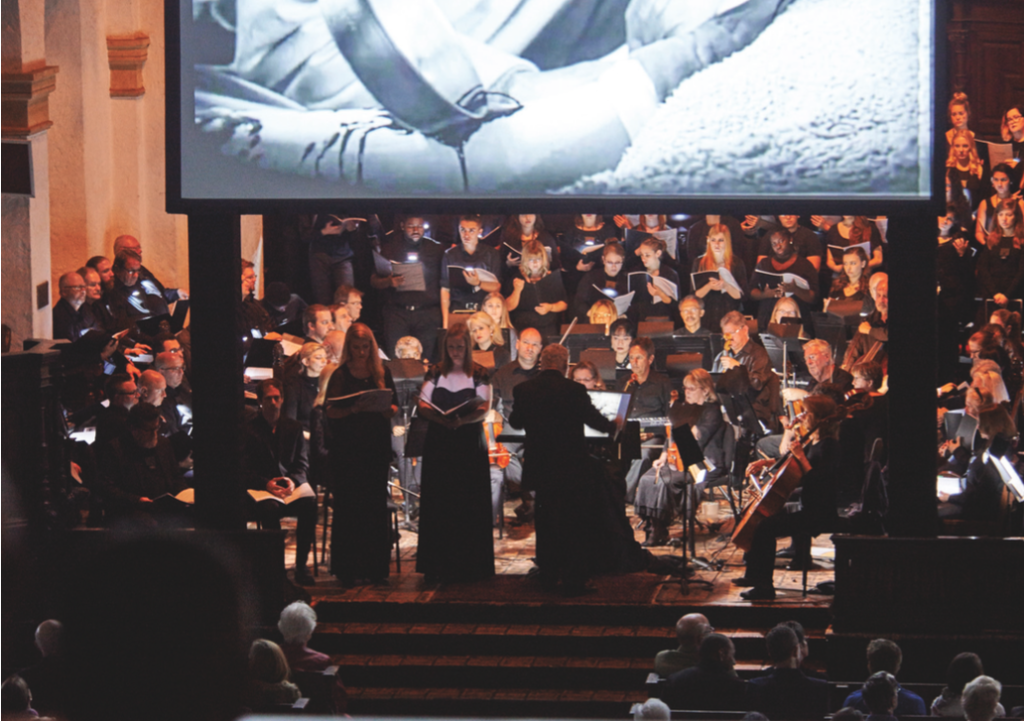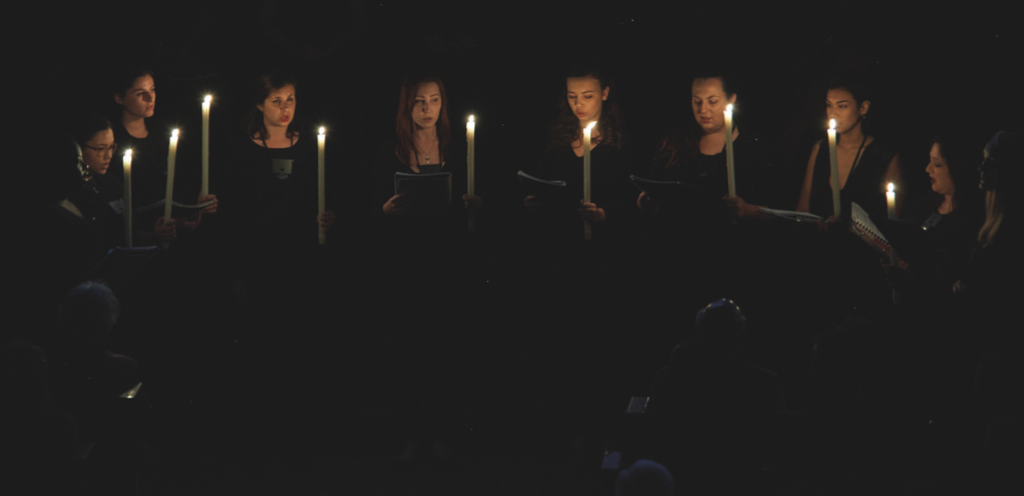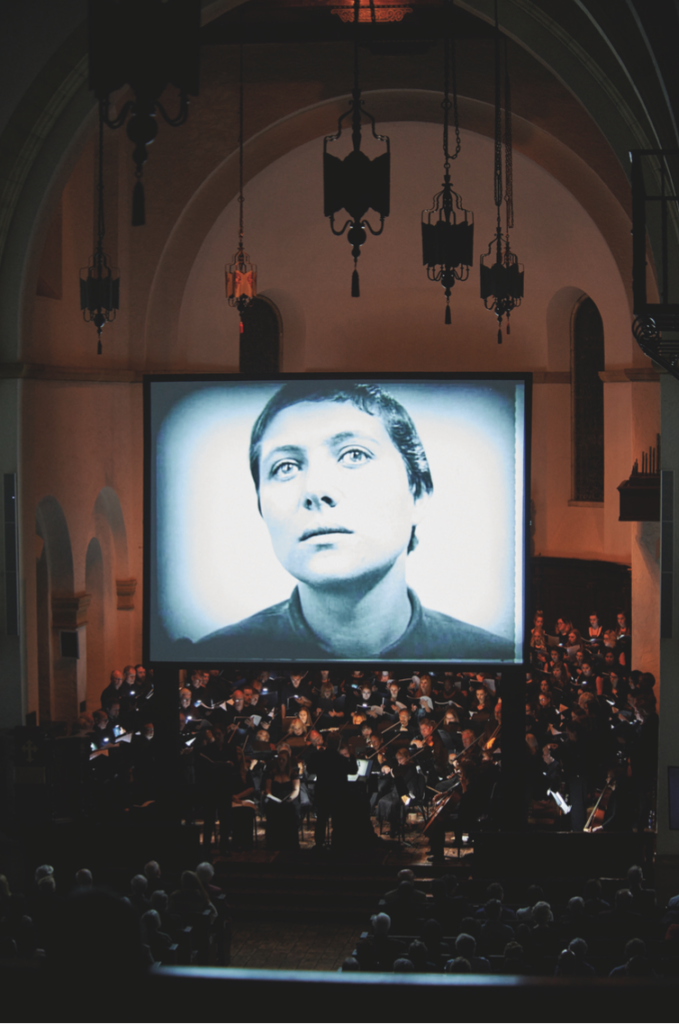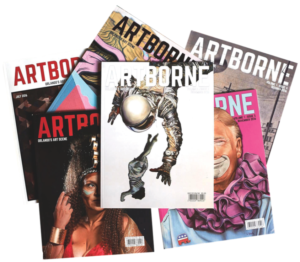Founded at Rollins College in 1935, the Bach Festival Society of Winter Park is the oldest continuously operating arts organization in Central Florida. Led by artistic director and conductor John Sinclair since 1990, the Bach Festival Society has forged a reputation as a mainstay of our cultural calendar and a pillar of the arts community. That reputation rests in part on the formidable forces brought to bear: with a full-sized professional orchestra and a more than 150-voice auditioned volunteer choir, Sinclair is able to lead the group through live performances of massive works that are themselves considered mainstays of the historical repertoire, such as Beethoven’s 9th Symphony, Brahms’ German Requiem or Carl Orff’s Carmina Burana.

Alongside the Bach Festival’s longstanding commitment to devote its resources to these large-scale masterpieces is their commitment to honor the new. On November 18 and 19, the Bach Festival presented Voices of Light, a large-scale multimedia work conceived by composer Richard Einhorn in 1994. Voices of Light merges Carl Theodor Dreyer’s 1928 silent film The Passion of Joan of Arc with a live performance of Einhorn’s original music for orchestra, chorus, and soloists.
By itself, the film has a fascinating history. Based on the actual transcript of the trial of Joan of Arc, and starring Renée Jeanne Falconetti, the film depicts her captivity, trial, and execution in England. Henry Maldonado, The Enzian Theater’s president and collaborator with the Bach Festival for the event, says that we “watch these classics in the present. Great films stand on their own. We don’t need to make allowances for them.”
What Maldonado means about the power of classic films when viewed in the present, is that a classic film’s direction and treatment of themes allow viewers to identify sympathetically with the film’s characters, and within that identification, to recognize our own humanity. The Passion of Joan of Arc thematizes feminine power in the face of patriarchal oppression and persecution; individual power vs. institutional authority; and personal beliefs versus doctrine. The film is intense, with a focus on Joan of Arc’s experience: her courage, her doubts, and her renewed resolve in the face of mounting pressure are all presented in often extreme, close-up detail. The authorities scan like living portrait paintings—wrinkled, grey, and imperious. The film is, at times, uncomfortable to watch, with its passionate foreground hyperrealism set against a background deliberately skewed to be expressionistic and off-putting. The added fact that Voices of Light was performed in the The Knowles Memorial Chapel at Rollins College created a setting conducive to viewing the film in the present.

John Sinclair has made a regular habit of presenting works by living composers out of personal interest and a sense of obligation to the historical role that conductors often play as facilitators of new masterpieces. “I’ve always felt that an organization like the Bach Festival should also do new pieces. Bach’s music was also once new. Bach would feel the same way.” Sinclair loves “the challenge of being the first interpreter, along with the potential to affect performance practice. I get to participate in the spirit of creative composition.”
Einhorn’s music indeed afforded Sinclair an opportunity to participate creatively. For example, the opening chant melody is unassigned by the composer in terms of who sings it. Einhorn chose to leave that to the discretion of whomever is performing the work. Sinclair chose to treat it as a candle-lit processional sung by college women from Rollins, as a subtle thematic tie-in that primes us to make the connection between the film’s depiction of the oppression of women and the continued persistence of the issue in contemporary society.
There are also unusual challenges for the conductor. The film is a fixed entity that will not change in terms of its timing. In Hollywood, a film score is typically the final audio element added to a film, after the dialogue, foley, and additional effects are finalized. When a film score is recorded, there is a tempo-based click track that the conductor can follow over headphones so that the timing of the music lands precisely with the intended hit-points. To aid this process, SMPTE (Society of Motion Picture and Television Engineers) time-code is stamped onto contemporary films to aid with synchronization of all audio elements. Sinclair didn’t have the benefit of SMPTE time-code or a click track. It was no easy task, but he feels that it enhanced his appreciation of the film because he had to identify for himself where he thought the hit-points should be, choosing things like “left foot hits tile,” or “kind monk nods.” It meant behaving as though he was an accompanist to the film, manually speeding up or slowing down his massive ensemble to adjust for the demands of both the music and the film in real time.

The success of Voices of Light is representative of a trend. Other recent, well-received Bach Festival Society concerts have also featured contemporary works. Paul Moravec’s Music, Awake! was commissioned by the Bach Festival Society to celebrate John Sinclair’s 25 years as Music Director in 2015. In 2014, an evening was devoted to the music of Morten Lauridsen, including his O Magnum Mysterium and Lux Aeterna. The Lauridsen concert also represented another collaboration with The Enzian, who screened a documentary film about the composer called Shining Night. These events have typically included appearances by the composers themselves for panel discussions and other events and classes that benefit audiences and students.
Especially exciting is John Sinclair’s renewed commitment, starting in 2017, to presenting not just contemporary works, but new works by composers living right here in Central Florida. Sinclair states that “the success that we had with the Lauridsen concert helped pique the interest of the local audience. It helped break down stereotypes about new art. This is going to allow an ongoing flow of this, on a bigger scale. Maybe it can lead to a whole evening of new, local work.”
In the 2017-18 season we will hear Dan Crozier’s new double clarinet concerto, and starting in 2018-19, with the cooperation of the Central Florida Composers Forum, at least one new choral work by a local composer will be presented annually.
Commitments like this to nurturing local artists at the grassroots level make Orlando an increasingly exciting and promising cultural scene.
Photo by Jason Fronczek
For more information on The Bach Festival Society see http://bachfestivalflorida.org/. For more information about The Enzian Theater see http://enzian.org/. Voices of Light was made possible by Gladdening Light, an organization whose mission “is to explore transcendent elements of art through hosted conferences, exhibits & public performance, cloistered retreat, and pilgrimage.” For more information on Gladdening Light see http://gladdeninglight.org/. For more information on Richard Einhorn see http://www.richardeinhorn.com/.
